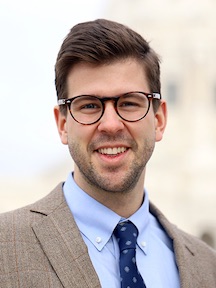By Nick A. Cohen
When he was five years old, Stu Lourey (ΦBK, Carleton College) began his political career. Attending a union strike at a prison in north-central Minnesota with his mother, Lourey made sure to shake the hands of each guard and staff member, thanking them for their commitment to building a better workplace and protecting workers’ rights. At such a young age, he was already picking up the mantle of public service that his family has carried for three generations.
But Lourey, who recently ran for a vacant Minnesota State Senate seat, is no mere political machine or calculating politico. He is a thoughtful, inquisitive, and empathetic individual, characteristics he learned through his education. While growing up in rural Minnesota, halfway between the Twin Cities and Duluth, the importance of a liberal arts education was always impressed upon him. “My mom always held up liberal arts education as the pinnacle,” Lourey said.
A liberal arts education, in Lourey’s view, goes far beyond teaching one how to think. “More so, it teaches you how to ask good questions,” he explained. And the ability to ask good questions, and to listen intently to the answers, is the basis for all of his political work. “It is really important to be able to see from multiple perspectives and to interrogate from those different perspectives…the foundation of any kind of organizing work or political work is your ability to connect with people,” he observed.
The ability to connect is not necessarily a skill taught in the classroom, but rather a product of the diverse environment created by liberal arts institutions. “When you think about a liberal arts education, what is so great about it is that it brings people from all different experiences and perspectives together. And that’s where a lot of the learning happens,” Lourey said.
One of the reasons he feels comfortable relating to folks from all different walks of life is because of the network of friends and colleagues he built at Carleton. Although he earned his degree in sociology and anthropology, he surrounded himself with people studying the natural sciences, political science, music, art and art history, and a whole host of other disciplines. This provides a “frame of reference for knowing what people are thinking about and the kinds of questions that they ask in their discipline,” a framework Lourey leaned on every day as he traveled around rural Minnesota to listen to folks in the community he campaigned to represent.
Lourey is adamant that the most important lesson he learned through his education is that “everyone has something interesting to offer and to add,” he said. The ability to listen and to learn is something all education should strive to teach, and a perspective that Lourey believes “is something that we can bring to our entire education system.”
He pointed to Pine Technical and Community College in Pine City, Minnesota, as an exemplar of this approach. Pine Tech has added a liberal arts curriculum to its vocational training and has implemented a program to provide full tuition waivers for the first year for students coming from the surrounding nine school districts. This creates a learning environment “where so much of the student body is non-traditional students,” he explained, a ripe scenario in which to learn from the experiences and perspectives of others. Plus, Lourey added with a large smile, “having trades right alongside a traditional liberal arts curriculum—that’s right in the spirit of liberal arts!”
For Lourey, the most important thing that his liberal arts education taught him, and something that should be championed throughout the entire education system, is perspective—the ability to see, to listen, and to find value where value lies.
Nick A. Cohen (ΦBK, Carleton College) recently completed his bachelor’s degree in international relations with a minor in European studies. Carleton College is home to the Beta of Minnesota chapter of Phi Beta Kappa.




